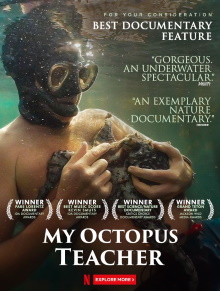This is a tremendously successful and well known documentary, having won an Oscar for its category last year. I held off on watching this for a while however as its title seems incredibly presumptuous and having read a little of its premise, it seems likely to be a just-so story made up in the editing. Now that I’ve seen it, I’m pleased to say that it doesn’t go so far as to say that the main character tamed an octopus while the images they captured are absolutely amazing. I could have done with less dramatizing but this is a truly impressive documentary.
Filmmaker Craig Foster recounts how, during a particularly stressful period in his life, he took to freediving into an underwater kelp forest near Cape Town in South Africa where he has his home. He eventually notices and over time manages to befriend a particular young octopus who lives there. She tolerates him enough that he is able to freely handle her and film around her and so he is able to document pretty much her entire life. He is so dedicated at it that when he accidentally startles her such that she moves to a new den, he teaches himself how to track her movements underwater to locate her again. At one point, she is hunted by the natural predator of her species, a pyjama shark, and though Foster is anguished, he decides not to intervene in the natural order of life and one of her arms is bitten off. He is relieved that over the course of the next few months, she is able to recover and regrow the severed arm. But as the common octopus apparently has a lifespan of only one to two years, this story can only ever end one way.
Foster’s self-introduction at the very beginning is kind of irritating as he emphasizes how he was in the doldrums until he found new purpose in documenting this octopus’ life. It’s ridiculous how he credits the octopus but fails to acknowledge how extraordinarily privileged he is to be able to maintain a house in that incredible location and to have the financial means to be able to take a year out of his life to devote to this personal project. The documentary’s title refers to how this octopus taught him lessons about the fragility of life, which makes for nice sounding fluff, but is hardly credible given that he was always a documentary filmmaker and his wife is a notable environmentalist. The film tries to spin a story about this being a personal relationship between Foster and the octopus, with Foster’s son being sometimes a guest, but obviously he had an entire crew to help him make this film and indeed the directorial credit goes to two other people. Maybe this kind of storifying helps win over audiences but I find it off-putting. The story of the octopus alone is vivid and fascinating enough that the insertion of Foster’s personal drama into it is completely unnecessary.
That said, being able to focus on one single creature instead of the more impersonal view of a population we usually see in most nature documentaries is genuinely amazing. The range of behaviors she exhibits is astounding, hunting, trying to evade her predators, even gathering up shells to use as armor, playing with a school of fish passing through her territory and so on. Foster’s dedication is impressive as well as he reads up on all the scientific knowledge he is able to find on the species learn how to track her and understand her behaviors. He even draws a rudimentary map of the kelp forest and the things he finds in it. Reading that they are considered a nocturnal species, he goes out at night and sees for himself that she is indeed more active at night. His coverage of her life is so complete that I have to think he has made a significant contribution to the collective body of knowledge on the species from his year-long effort. Naturally the images captured here are all high quality and extremely beautiful.
One other downside of this film’s approach is that by focusing so tightly on this one octopus, we skip over some of the other fascinating life that inhabits this particular patch of the underwater world. We can see a little of that variety in the outro here. From what I understand however the same team that captured these images were also responsible for the some of the footage in the same location that we’ve already previously seen in the Blue Planet series so we can be confident that all footage of any interest will be commercialized. That’s another reason why as much as I love the images that they managed to capture, I’m also irritated by the human drama that they try to spin around the project. Foster didn’t just randomly decide to start freediving in this location as a form of personal therapy as the film seems to imply. They’d known all along how beautiful and rich in potential the area is and were always intending to make a documentary even if the subject being a single octopus was a fortuitous, unexpected discovery.
